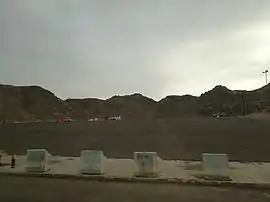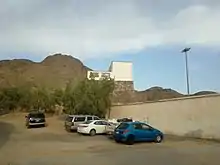Sela (Saudi Arabia)
Sela (Arabic: سلع) is a mountain in Medina in modern Saudi Arabia.
| Sela | |
|---|---|
| |
 | |
| Highest point | |
| Coordinates | 24°28′30″N 39°35′58″E |
| Geography | |
| Location | Medina, Saudi Arabia |

Mount Sela in the "District of the Seven Mosques" in city of Medina Municipality in Saudi Arabia. Sela means "sliced", because the mountain looks as if it is sliced several times.[1][2]
The Islamic prophet Muhammad in the Battle of the Trench prayed to God for victory on Mount Sela. Mount Sela was mentioned in several Hadith of the stories of Muhammad such as The Prayer for Rain, The forgiveness of Ka'b b. Malik.[3][4][5]
Sela is mentioned by Al-Hamdani in his book Geography of Arabian Peninsula as part of Medina city in his time 150 years after Muhammad.[6][7] His name and the name of his companions Umar and Ali are inscribed on a stone on top of the mountain.[8][9][10][11]
Sela is said to be mentioned in the bible, which may also refer to the Prophet of Islam:
11 Let the wilderness and its towns raise their voices;
let the settlements where Kedar lives rejoice.
Let the people of Sela sing for joy;
let them shout from the mountaintops.
12 Let them give glory to the Lord
and proclaim his praise in the islands.
13 The Lord will march out like a champion,
like a warrior he will stir up his zeal;
with a shout he will raise the battle cry
and will triumph over his enemies.
Muslims say that Jews were living in Medina near Sela Mountain because they read this prophecy and they knew that a prophet is coming. That is why whenever they fought with Banu Qurayza they used to say our time is near prophet is coming, he will fought with us against you.
However most Christians and Jews consider Sela in Isaiah 42 to be a reference to Sela in Edon, modern day Jordan,[12] which is located in ancient Kedar.
Christians claim that the word is Adonai (Jewish God). If they assume that this is the prophecy of Muhammad then this will make him God. In reply Muslim Scholars respond to this by saying that the word Adonai means "Lord" not only means "God" so The chapter predicts about warrior and this can be only on the Prophet Muhammad
.
References
- Al-Madinah Regional Municipality, Saudi Arabia Archived 2014-02-22 at the Wayback Machine
- Sela' (Medina) citations at Book Mujam Buldan by Yaqut Hamwi, Volume I: pages 5,1,5.145.237.432.663.671 Volume ii:pages ,32.111. Volume 3: pages 117.661.767.839. Volume IV: pages 434.439,.468.556.626 al-Hamawi, Yaqut (1994). Kitab muʻjam al-buldān. Tehran: Frankfurt am Main : Institute for the History of Arabic-Islamic Science at the Johann Wolfgang Goethe University. p. 323. OCLC 61192389.
- Watt, Montgomery. Muhammad at Medina. pp. 37, 169. ISBN 9780199064731.
Mount Sela' (Sal') of Medina mentioned
Alt URL - "Hadith, Sahih Bukhari: Volume 2, Book 16, Number 126". mention of Mountain of Sila' in Hadith. 605. Retrieved 11 May 2013.
- "Hadith, Sahih Bukhari: Volume 3, Book 38, Number 500". mention of Sala' in Hadith. 605. Retrieved 11 May 2013.
- Hamdani, al-Hasan. Geography of the Arabian Peninsula.
- "Hadith mentioning Mount Sela'".
- Mountains of al Madinah al Munawarah, Saudi Arabia, Pilgrims Guide, Government of Saudi Arabia
- "article about Mount Selae in Pilgrims guide Saudi Arabia".
- "article about Mount Sela' in Medina".
- al-Khattab, compiled by a group of scholars under the supervision of Shaikh Safiur Rahman Mubarakpuri ; translated by Nasiruddin (2004). History of Al-Madinah Al Munawarah (2nd ed.). Riyadh: Darussalam. p. 113. ISBN 9789960892115.
- Forder, A. (November 1901). "Sela or Petra, "The Strong City." The Ruined Capital of Edom". The Biblical World. 18 (5): 328–337. doi:10.1086/472910. ISSN 0190-3578.
